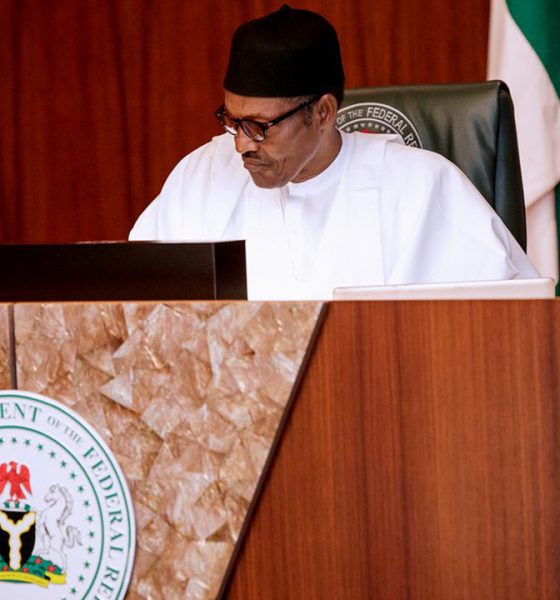The attempt by President Muhammadu Buhari to pin the $9billion British court’s judgement debt on former President, Goodluck Jonathan, has been dismissed by the Process and Industrial Developments Limited (P&ID), the very Irish company, that is in the thick of the entire saga.
P&ID in a clear statement, on Friday, completely absolved the former President of culpability and blamed both Buhari and the Attorney General, Abubakar Malami responsible for the development.
The company, in attempt to set the record straight, P&ID, detailed how the Buhari government, practically slept on the issue and accused Malami particularly of trying to revise history and introduce allegations of contract fraud.
Read the full statement:
Malami’s Revisionist History
It is another day, and with it comes another attempt from the Nigerian Government to create a fictional history of the P&ID case.
This week’s series of desperate conspiracy theories point to something deeper: the Buhari Administration is refusing to admit its own role in the P&ID case from 2015-2019 after it came into office.
Appearing on CNBC Africa, Attorney General Abubakar Malami sought to wipe his hands and the hands of the Buhari Administration clean when he stated, “[t]he government as a unit was delicately involved. And that was the government in 2010, the award was in 2012, and then three years thereafter the current administration under the leadership of Muhammadu Buhari came into place. So the time when this administration came to place in 2015, the award was over three years, there was no appeal, no application for execution, no application to set the award aside.”
Attorney General Malami seems to have a case of amnesia.
Let’s set the record straight:
May 3, 2015: P&ID offers to settle the dispute with the Nigerian Government for $850mm. President Goodluck Jonathan indicates they are handing over the negotiations to the incoming Buhari Administration.
May 29, 2015: Muhammadu Buhari is sworn in as the 15th President of Nigeria, but fails to appoint a cabinet for five months.
July 17, 2015: The Arbitration Tribunal found in favor of P&ID (i.e. – the Liability Award). The new Buhari Administration did not make any attempts at settling or negotiating with P&ID, and did not make any effort to challenge the decision.
November 11, 2015: Attorney General Malami was sworn in November 11, 2015, just under three months after the Liability Award.
May 27, 2016: The Arbitration Tribunal wrote to the Nigeria Government confirming that: “As the parties will be aware from Procedural Order No 12, the Tribunal has decided that the seat of the arbitration is England. It follows that the Federal Court of Nigeria had no jurisdiction to set aside its Award.” Neither Attorney General Malami, nor any representative of the Buhari Administration did anything in response other than continue with the proceedings, thereby tacitly accepting the analysis of the Arbitration Tribunal.
June 24, 2016: Having failed to set aside the Liability Award by falsely claiming the seat of arbitration was in Nigeria; not England, Attorney General Malami wrote personally to the arbitrators to say “my office has taken over the handling of the above arbitration on behalf of the Ministry of Petroleum Resources.” He asked for and obtained an extension of time to file a defence to quantum, and appointed his own legal team in place of the Ministry of Petroleum Resource’s legal team.
August 30-31, 2016: The Quantum Hearing (i.e. – amount of damages payable) takes place in London. Attorney General Malami’s legal team conducted Nigeria’s defence at the quantum hearing. Expert witnesses as to quantum were called to give evidence and were cross-examined.
After the Quantum Hearing, Attorney General Malami instructed his lawyers to request a standstill agreement, which would take effect from the date of the Award.
This fact has never been publicly reported until today.
January 31, 2017: The Arbitral Tribunal issued a final award, ordering Nigeria to pay P&ID $6.5 billion plus $2.3 billion in uncollected interest as of March 2018.
February 17, 2017: The Award on Quantum was delivered to the parties on February 17, 2017. Despite the 60-day standstill having been agreed by P&ID, Attorney General Malami made no attempt to negotiate with P&ID during the 60 days following the handing down of the Quantum Award.
April 28, 2017: After the 60 days had expired, Attorney General Malami instructed his lawyers to write to P&ID’s lawyers and explained that “The delay was occasioned by the bureaucracy of the Federal Government in a bid to determine a reasonable strategy after receipt of the Arbitral award.” The Attorney General’s lawyers added: “we now have the authority of the Vice President of the Federal Republic of Nigeria to meet with the Claimant to negotiate the Terms of the Arbitral award.”
Today: In the lead up to the judgment by the English Commercial Court, Attorney General Malami allowed the time for acknowledging service in both the United States and London to lapse without filing any response. In both jurisdictions, Nigeria’s lawyers Curtis Mallet had to apply for ex post facto extensions of time and make the necessary apologies and explanations to the court.
In London, a senior Curtis Mallet partner explained that the Claim Form was “immediately filed and not passed up the chain of command” at the Ministry of Justice. The partner pleaded that “the delay was neither deliberate nor intended to be disrespectful to the Court.”
In the US, Curtis Mallet explained that the deadline was missed because they were in the process of being formally retained by the Nigerian Government and had been instructed to enquire about the potential for a settlement
The Attorney General’s pronouncements in the Nigerian press are a clear attempt to cover up his own incompetence and that of the Buhari Administration. This is a matter, which could have been settled shortly after he took office in November 2015 for $850 million. Instead, he personally took the decision to gamble on the arbitration and turned an $850 million liability into a $9.6 billion liability.
And at no time since has Attorney General Malami assumed responsibility has he raised any allegation of fraud or scam, either in the arbitration or in the subsequent enforcement proceedings. The reason for this is that there was no fraud. All of this raises serious concerns for foreign investors in Nigeria, whether you are investing in a commercial enterprise or buying Eurobonds. Not only will Nigeria deliberately refuse to pay an international arbitration award backed by an English Court, but they are prepared to launch sham investigations and character assassinations when all else fails.
This is a serious assault on the Rule of Law by a demonstrably dishonest administration.
Meanwhile, P&ID is now focused on vigorously enforcing its legal rights in the UK, including seizing Nigerian assets to satisfy the award. This will begin as soon as possible.
Source: whirlwindnews

 News6 years ago
News6 years ago
 Featured6 years ago
Featured6 years ago
 Boss Picks6 years ago
Boss Picks6 years ago
 Headline6 years ago
Headline6 years ago
 Headline6 years ago
Headline6 years ago
 Headline5 years ago
Headline5 years ago
 Headline6 years ago
Headline6 years ago
 Headline6 years ago
Headline6 years ago














